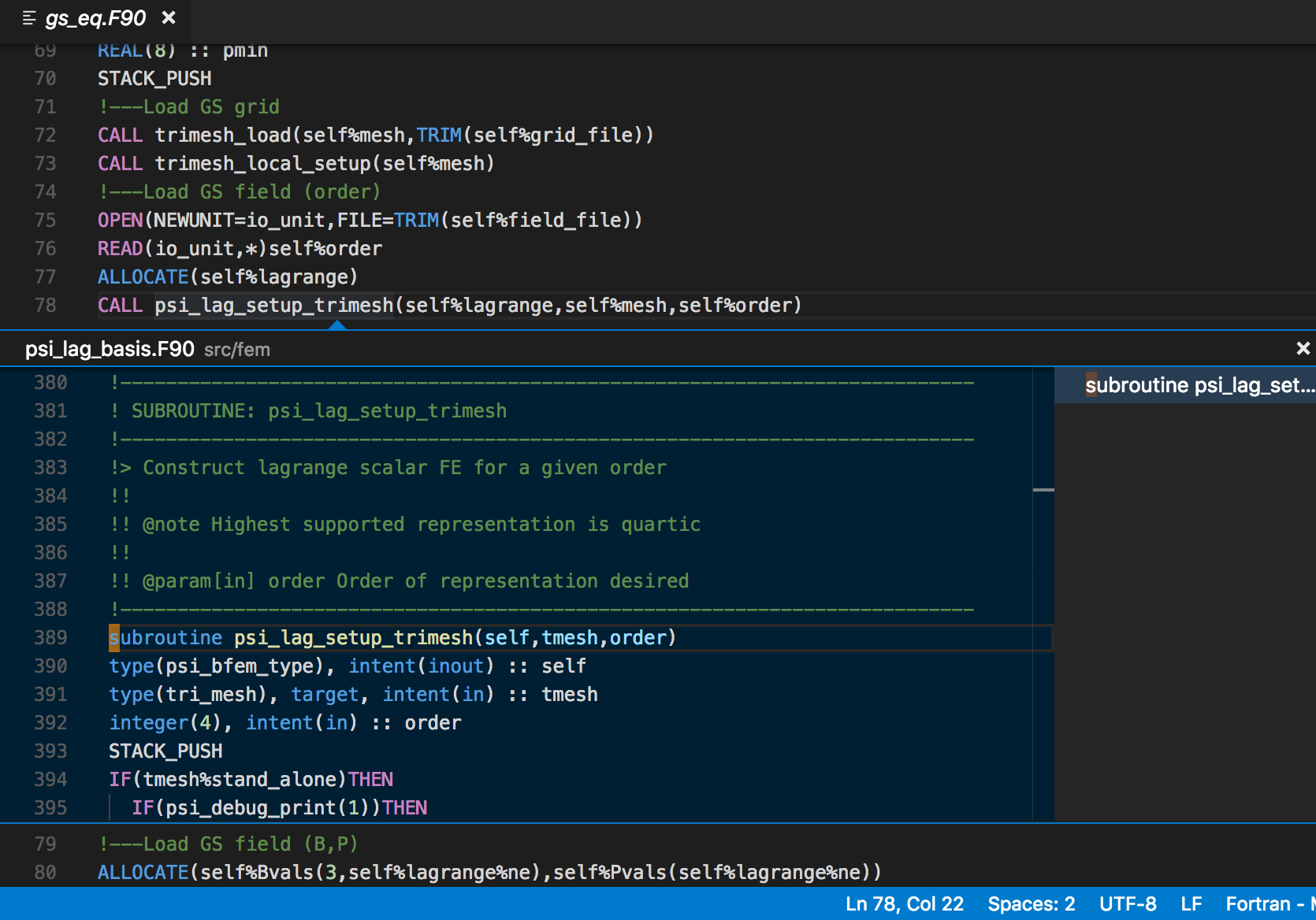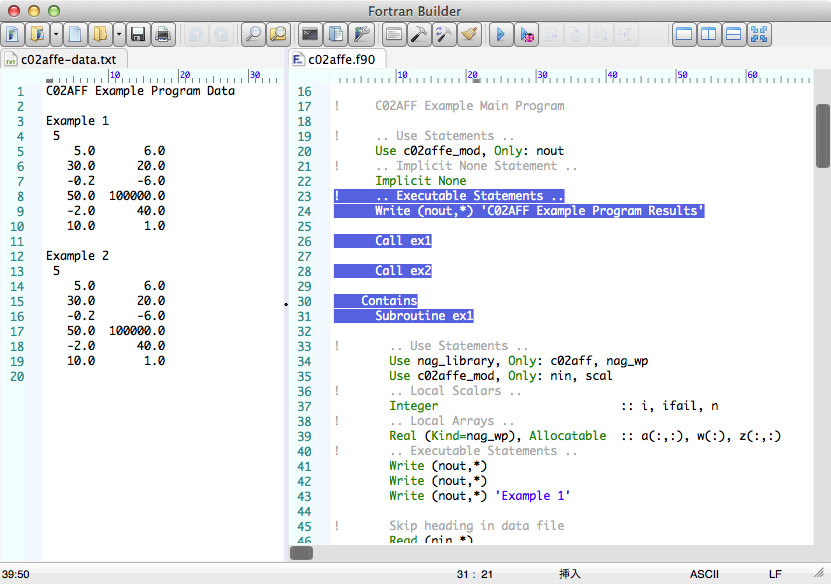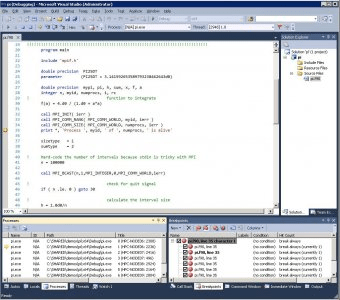If you'd like to use your Apple Mac with OS X for some numerical computation, this site could be useful to you. Most of these packages have been compiled/tested on several version of OS X and XCode Tools. Feel free to contact me with questions or problems!
GNU Fortran compiler Unfortunately Xcode doesn't contain a Fortran compiler, therefore you will have to install one. We recommend official GNU Fortran binaries from F.X.Coudert. CRAN High-Sierra builds currently use GNU Gortran 8.2 from that page (note that even though compiled for Mojave it is compatible with High Sierra). Intel Fortran Compiler Mac Os X Download; Intel Fortran For Mac Os X; I am not a computer scientist or Fortran guru and, as such, am unlikely to be able to help you with Fortran code, compilation or runtime problems. There are several options available for installing gfortran for Mac OS X, other than installing from source code.
Computation Tools :: C/Fortran

GCC 4, 5, 7, 8, 9, 10 (auto-vectorizing gcc with OpenMP):
Compiled using source code from the GNU servers. This contains current versions (8.3 is the stable release) of gfortran (free, open source, GNU Fortran 95 compiler), gcc (GNU C) and g++ (GNU C++) compilers that can perform auto-vectorization (i.e. modify code to take advantage of AltiVec/SSE, automatically) and other sophisticated optimizations like OpenMP. For more information, see this webpage. Download my binaries, and cd to the download folder. Then gunzip gcc-10.2-bin.tar.gz (if your browser didn't do so already) and then sudo tar -xvf gcc-10.2-bin.tar -C /. It installs everything in /usr/local. You can invoke the Fortran 95 compiler by simply typing gfortran. You will also need to have Apple's XCode Tools installed from the Mac App Store. With XCode 4 or better you will need to download the command-line tools as an additional step. You will find the option to download the command-line tools in XCode's Preferences. On 10.9 Mavericks or higher, you can get the command-line tools by simply typing xcode-select --install. And on Catalina, you may have to specify an additional include and library path -I/Library/Developer/CommandLineTools/SDKs/MacOSX.sdk/usr/include -L/Library/Developer/CommandLineTools/SDKs/MacOSX.sdk/usr/lib for the compiler to find the system headers and libraries.
Binaries:
gcc-m1-bin.tar.gz,gfortran-m1-bin.tar.gz (gfortran only), updated Dec 2020 (Big Sur -- M1 Apple Silicon).
gcc-10.2-bin.tar.gz,gfortran-10.2-bin.tar.gz (gfortran only), updated Nov 2020 (Big Sur).
gcc-9.2-bin.tar.gz,gfortran-9.2-bin.tar.gz (gfortran only), updated Oct 2019 (Catalina).
gcc-8.3-bin.tar.gz,gfortran-8.3-bin.tar.gz (gfortran only), updated April 2019 (Mojave & Catalina).
gcc-8.1-bin.tar.gz,gfortran-8.1-bin.tar.gz (gfortran only), updated June 2018 (High Sierra & Mojave).
gcc-7.3-bin.tar.gz,gfortran-7.3-bin.tar.gz (gfortran only), updated June 2018 (High Sierra).
gcc-7.1-bin.tar.gz,gfortran-7.1-bin.tar.gz (gfortran only), updated June 2017 (El Capitan & Sierra).
gcc-5.1-bin.tar.gz,gfortran-5.1-bin.tar.gz (gfortran only), updated June 2015 (Yosemite & El Capitan).
gcc-4.9-bin.tar.gz,gfortran-4.9-bin.tar.gz (gfortran only), updated Nov 2014 (Mavericks & Yosemite).
gcc-4.8-bin.tar.gz,gfortran-4.8-bin.tar.gz (gfortran only), updated Oct 2013 (M. Lion & Mavericks).
gcc-4.7-bin.tar.gz,gfortran-4.7-bin.tar.gz (gfortran only), updated July 2012 (Lion & M. Lion).
Documentation: click here!
g77 3.4 :
This is the FINAL release of g77 (version 3.4 compiler). Future versions of GCC will have gfortran (see above). Download my binaries, and cd to the download folder. Then gunzip g77-bin.tar.gz (if your browser didn't do so already) and sudo tar -xvf g77-bin.tar -C /. It installs everything in /usr/local. You will need to have Apple's Developer Tools installed. They are included on the retail DVD version of OS X and also available as a free download from Apple's Developer Site. Please install the most current version of Developer Tools. Thanks to James Wookey for the Intel Mac version of g77.
Binaries: g77-bin.tar.gz (PowerPC only), g77-intel-bin.tar.gz (Intel Mac only), updated October 2006.
Documentation: click here!

F2Cbased Fortran:
This is the oldest Fortran compiler available for OS X. Its beenaround since OS X was in a public beta state. Download this shellscript: buildf2c, type chmod +xbuildf2c and then sudo ./buildf2c. The script will grabf2c source from Netlib repositories and install a f2c basedcompiler in /usr/local/. You aredone! The compiler can be envoked by the commands fc orf2c.
Install script: buildf2c
Documentation: click here!
Computation Tools :: Octave
Octave:
Octave is an open source, Matlab-like numerical analysis software package that is very popular among scientists and engineers. The good folks over at Octave-Forge provide an OS X style Octave application, with drag and drop installation! I recommend their binaries (links below).
Source: Octave
Binaries: Octave application, updated May 2011.
Documentation: clickhere!
Computation Tools :: Cactus, RNPL, etc.
Einstein Toolkit:
The Einstein Toolkit is an open-source software framework specifically targeted to the research area of numerical relativity and astrophysics. The broad aim of the toolkit is to provide the core computational tools that enable scientific research in this area, and take advantage of emerging petascale computers and advanced cyberinfrastructure.The Einstein Toolkit compiles and runs great on Mac OS X. A critical component of this toolkit is the Cactus Computing Toolkit (see below).
Source: clickhere!
Documentation: clickhere!
CactusCode (Numerical Computing Toolkit):
Cactus is an open source problem solving environment designed forscientists and engineers. Its modular structure ('thorns') easilyenables parallel computation across different architectures andcollaborative code development between different groups. It ismainly used for solving complicated PDE's. It highly portable, andhas some really remarkable features like observing and even'controlling' or 'steering' a running simulation using an ordinaryweb browser! Here is a link to a perpetual demo running at LSU Cactus Demo. Check it out!Cactus compiles and runs great on Mac OS X.
Source: clickhere!
Documentation: clickhere!
RNPL (Rapid Numerical Prototyping Language):
This is a great tool that takes as input details about the form ofan equation (usually a partial differential equation), and someparameters .. and then spits out a C or FORTRAN Code that solvesthe equation numerically using established iterative numericaltechniques. RNPL can also be used for producing skeleton programsand for converting existing programs. Download the source, compileand install. This source has been modified to compile with OS X. Orget my binary distribution. You probably want to install this in/usr/local, to do so gunzip rnpl-bin.tar.gz (if your browser didn't do so already) and then sudo tar -xvf rnpl-bin.tar -C / and you are done! You will need to use the F77 flag: -fno-second-underscore, for RNPL generated F77 codes to compile properly.
Source: rnpl.tar.gz
Binaries: rnpl-bin.tar.gz, updated 2003.
Documentation: click here!

Computation Tools :: Other Miscellaneous
The GRAVSIM Package:
GRAVSIM is a package that contains an ever evolving and hopefully growing set of gravitational N body solvers. These solvers attempt to track the motion of a set of bodies moving under the influence of gravity. They are used in many areas of astrophysical study including planetary motion, star cluster formation and stability and galactic formation, stability and interactions (i.e. colliding galaxies). This package is highly AltiVec and DP optimized!
Source and Binaries: click here!
Documentation: click here!

Xmgr Grace:
This is a very easy to use, open-source, X11 based, plotting tool. I used it during my graduate school days and still love it. Its excellent especially for students and free! Note: I didnot create this binary, but I have tested it on both Intel and PPC Macs. It works very well. Move the Grace application to the system /Applications folder for it to function correctly.By the way, if you are looking for a nice, easy to use, 2D and 3D,plotting package for OS X, try pro Fit. It works great. They have a free trial version, that is not time-limited and is full-featured. It just has some restrictions on the volume of data you can make it handle. Even the full version is very inexpensive.
Binaries: Grace (PowerPC only), Grace, updated Aug 2014.
Documentation: click here!
Intel® Fortran Compiler is a part of this comprehensive suite of performance libraries and development, analysis, and debugging tools. Build and modernize code with the latest techniques in vectorization, multithreading, multinode parallelization, and memory optimization. Intel”s compilers may. Apple-style installers of gfortran for Mac OS X are made available for download here. To install any of them, you need to have the Apple Developer Tools installed, as well as “command line developer tools”. These can be downloaded from (free registration required). Click on Downloads Developer Tools in the sidebar. As such it fully supports compilation into fat files like gfortran -arch i386 -arch ppc -arch x8664 -arch ppc64 t.f -o t on both Intel Macs and PowerPC Macs (32- and 64-bit). Dependent libraries are fat as well, avoiding problems known from other Fortran builds (such as those from HPC). As such it fully supports compilation into fat files like gfortran -arch i386 -arch ppc -arch x8664 -arch ppc64 t.f -o t on both Intel Macs and PowerPC Macs (32- and 64-bit). Dependent libraries are fat as well, avoiding problems known from other Fortran builds (such as those from HPC).
Apple-style installers of gfortran for Mac OS X are made available for download here. To install any of them, you need to have the Apple Developer Tools installed, as well as “command line developer tools”. These can be downloaded from http://developer.apple.com/ (free registration required). Click on Downloads > Developer Tools in the sidebar. Find the latest version supported on your platform: XCode 3.1.4 for Leopard, XCode 4 for Snow Leopard, XCode 4.6.3 for Lion, Xcode 5.0.1 for Mountain Lion and Mavericks.
Technical details
Voicemod mac download. The gfortran package for MacOS X installs all files in the /usr/local/gfortran directory, and a single symbolic link (/usr/local/bin/gfortran). If you need to uninstall it (since Apple packages do not support auto-uninstalling), you need to type the following command in a terminal, as administrator:
As every time you use administrator privileges, double check your command and make no mistake!
Installing and using gfortran Fortran on a Mac.
So if you”re in MATH 190 and you”re having a hard time with installing fortran95 or any of the other suggested compilers,don”t worry, there is a solution! On every Mac computer, there is a application called terminal that allows you tocommunicate with the computer and get stuff done.
So first things first, you need to be connected to the internet. Open Terminal, and type the following command
“sudo apt-get install gfortran”
Terminal will then ask a password, enter it and allow the program to install on your computer. This is your compiler;it”s called gfortran! If this command doesn”t work for some reason, just go to Google search “gfortran” and you shouldeasily find a link to download it from.
It doesn”t have a fancy user interface like SciTE, however it gets the job done. Now that gfortran is installed on yourmachine, you can get to work. But you must learn how to use a text editior first.
Download amazon prime video on mac. The textedit, however appropriately named is pretty useless for witing programs because it insists on saving files as .rtf, which can”t be compiled by gfortran.
All Macs come with a few editors, namely: VIM, nano and emacs. To use them, open up terminal again, and type any of the following
“vim”
“nano”
“emacs”
This will open up the text editor inside terminal, where you will code and compile. I find that vim is really easy and effective to use.Most professionals prefer emacs, and nano is very easy, but sometimes too simply made. However, try out all three (look on Google fortutorials on how to use these editors).
Now that you have a compiler and and editor, you have everything you need to write your programs for this class! So, let”s write aneasy “Hello World” program in f95.
In your editor, type the following.
program test
print *, “Hello World!!”
endprogram
Save this program as hello_world.f95. Now the cool part; we”re going to use terminal to compile this code. The following command shouldbe committed to memory. To compile the code type (without the quotes)
“f95 -o test.exe hello_world.f95”
Download Fortran For Mac Pro
Download Gfortran For Mac
Let”s break this command down. The first part addressed the compiler you wish to use, in this case f95 (which comes with gfortran).If you coding in C++ you would put g++ or something instead of f95. The next part “-o” tells f95 to do something. In this case, we”re telling f95 to make test.exe out of hello_world.f95. Note, the name of the executable file is irrelevant. I could”ve named itelephant.exe or hello_world.exe o whatever, you get it.

To recap, address the compiler, command it to do something (with -o), in this case “test.exe hello_world .f95”, we”re telling it tomake an executable called test.exe out of hello_world.f95
If you type this correctly, a new line in terminal should appear. This means your code compiled just fine and the .exe file was made.Now you want to run the file! The final command you need to learn is the following (again without the quotes),
“./test.exe”
This simply means, “Run the executable file, test.exe”. Press enter after typing the command, and the program should run!
Download Gfortran For Mac
Fortran For Mac Download
Good luck!!
Neill Warrington